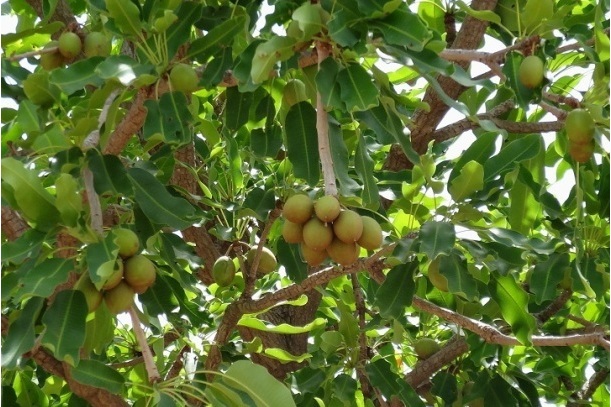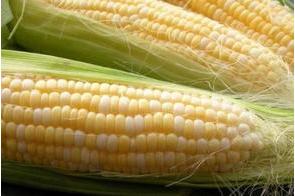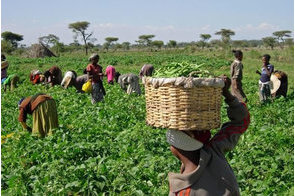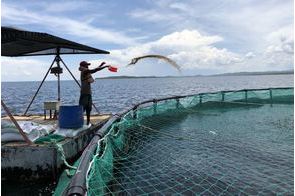Shea nut can unlock Ghana's agro-diversification and industrialization

Summary
As a critical input to high-end cosmetics, shea nut could rapidly move up the production scale.
Introduction
Known as women's gold, shea nut is a major source of livelihood for rural women living in Northern Ghana. Shea nut production has gone on for generations and has provided an invaluable source of income in addition to income from traditional crop production. This is particularly critical in the Northern semi-arid region where the long dry season means the depletion of household food stocks. Those households engaged in shea nut production can use the additional income to buy food at local markets during chronic shortages.
Ghanaian culture venerates the shea tree. Communities are prohibited from felling the trees or from individual ownership. Communities in Northern Ghana, along the border with Burkina Faso, also recognize the trees are critical in the fight against desertification.
Like many West African agriculture commodities, with potential for exports, there has been lack of significant investment in shea nut production. Targeted government assistance in the sector has been little to none. However, building Ghana's shea nut market could provide a critical platform for enhancing regional trade in a product that is growing in demand year-by-year and is beginning to catch the attention of regional and global investors.
Overview of the shea nut market
At full potential, West Africa's shea nut production could surpass 1 million tons annually. The current combined production capacity of majority of the region's shea nut producers, namely, Burkina Faso, Mali, Ghana, Nigeria, Côte d'Ivoire, Benin, Togo and Guinea is estimated at 600,000 tons, annually, with 350,000 tons in exports. Shea nut price per ton is roughly $250 per ton. The total market value for shea products in West Africa is estimated to reach $500 million within five years.
At national level, Ghana produces 10,000 tonnes of shea nuts per year. The shea nut sector covers 66 districts across the three Northern regions and limited part of Brong Ahafo and the Volta. About 600,000 women are involved as nut collectors and butter processors within the communities. The market is largely untapped as only 40% of shea nuts grown are collected due to the rudimentary methods for gathering the nuts.
Existing initiatives
A number of programmes have emerged in response to the growth in Ghana's shea nut market and the demand for development assistance for women engaged in the sector, particularly in the areas of education, microfinance and technology. For instance, the Shea Value Chain Reinforcement Initiative was established in 2009 with the aim to improve the incomes and living conditions of women who pick shea nut and are involved in processing nuts into shea butter. The initiative based on a collaboration between SAP (an international software company) and PlaNet Finance (based in France) brings together local microfinance agencies to improve access to credit. Women have benefited from the programme in a number of ways, such as by earning a premium price to a guaranteed buyer and being able to access information on prices directly to their mobile phones.
Social enterprises such as Starshea Ltd, work alongside the initiative to support women with finance, business and market access to international companies. The Sagnarigu shea butter processing centre also located in Northern Ghana is a support hub for women working in the sector which aims to boost incomes and build resilient livelihoods by strengthening marketing linkages and building capacity for women engaged in shea nut processing.
An innovative partnership between United Nations Development Programme (UNDP) and the Japanese Government set up in 2008 has provided support to women in Sagnarigu. Adamu Amidu, a 65-year-old Ghanaian woman, spent 12 years in the Sagnarigu Women's Shea Butter Group as a project beneficiary. She received training on processing shea nut into butter and soap products for export. "I used to make about GHC 6.OO (US$3.00) a month but now, I earn approximately GHC 50.00 (US$25.00) a month", she said in a UNDP report, United Nations in Ghana: Voices from the Field.
It is recommended that The Tamale Metropolitan Assembly should facilitate the introduction of a special marketing financing facility for users of the Sagnarigu centre through support from the Ghana Export Promotion Council (GEPC). Financing is especially needed to address the lack of processing equipment including stoves, roasters, dryers and milling machines. Ideally, this should be backed up by specific marketing arrangements for women to sell shea products on the local and international markets.
Challenges
A major constraint for women engaged in the shea nut sector is the absence of formal credit to expand their operations. Gaining credit is a challenge for the majority of women who lack formal land titles or assets that can be used as collaterals. Moreover, there is also a limited number of shea nut cooperatives to be able to apply for credit on group basis – thereby lowering the risk.
The availability of land for shea nut production has reached alarmingly diminished levels. This has prompted calls for government intervention. Lands formerly used for shea butter production are being sold to private developers who are clearing the shea trees for construction. Dr. Martha Awo of the Institute of Statistics, Social and Economic Research (ISSER) has urged for action to be taken to avoid the collapse of the sector as a result of such activities. Pragmatic efforts to allocate land for shea nut production were proposed as part of a collaboration between local chiefs, the government and the private sector.
Price regulation has also posed a challenge for the industry due to wide variations in seasonal prices making it difficult for women to achieve a surplus and re-invest in their businesses. Some form of government-led price control would be beneficial to achieving more stable shea nut production and avoid early seasonal sales when nuts are yet to mature and quality is low. Effective linkages also need to be created to link high quality shea nuts with the cosmetics industry – where there appears to be the strongest demand.
Market gaps and opportunities
The development of the shea nut sector could be accelerated by pushing African actors higher up the value chain and reversing the dominance of European companies involved in refinement of high-value shea products.
One Ghanaian company is bucking the trend by processing shea nut into stearin and oil in Ghana and exporting the products globally to markets in Asia, Europe and the United States. Ghana Speciality Fats is a collaboration between American and Singaporean investors. It has been in operation since 2008. Its main source of shea is from Women's Shea Nut Collective in Northern Ghana. It estimates that it will achieve 25,000 tons of processed shea nut per annum making it the largest shea processor in the country.
As part of a niche market with strong growth prospects, shea nut could move up the production scale rapidly due to its position as a critical input to high-end cosmetics. Tailored government support to an emerging agro-industry will prove essential in steering targeted investment towards capacity building, processing machineries and delivering improvements in product quality. Development aid agencies can also play a key role in delivering support to local communities currently engaged at the bottom of the shea nut value chain. This could prove critical, especially in terms of competing on the international market and securing investments for women who often reap the lowest financial rewards, despite adopting a central role in production.
Conclusion
Strong growth of Ghana's shea nut sector demonstrates the changing nature of non-traditional agriculture exports in a sub-region where close linkages with global value chains provide opportunities for rural communities to transform their livelihoods.
Nevertheless, current production meets only a tiny proportion of potential market share. If current trends continue, the shea nut sector could provide a platform for the rapid diversification of agriculture production and for early agro-industrialisation.
Key ingredients include widening technology adoption for small-scale processing. Reducing the dominance of western companies involved in high-value processing can only be achieved by improving the competitiveness of Ghanaian and sub-regional players. Moreover, the majority of unskilled shea nut producers need to be empowered through capacity building. Increasing their productivity is fundamental to ensuring the sustainability of the shea sector's current growth.
Joan Nimarkoh, Financial Nigeria guest writer, works as a Policy Consultant for the UN FAO. She is a graduate of International Development Studies (MSc) from the school of Oriental and African Studies, University of London, while specialising in African Studies.
Related
-
UN agency IFAD evaluates benefits of country offices in Africa
IFAD currently has 20 country offices in Africa, including a special regional service centre, based in Kenya.
-
Leveraging co-operatives to boost market access for smallholders
There are over 1.2 million agricultural co-ops around the world working to ensure the welfare of farmers and their ...
-
Finnfund invests $6 million to expand aquaculture in Zambia
Finnfund made the investment in an integrated tilapia aquaculture company, producing 12,000 tonnes of tilapia annually.







